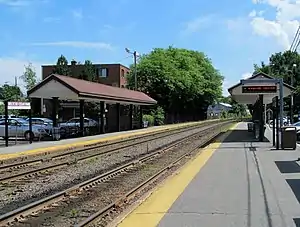Melrose/Cedar Park station
Melrose/Cedar Park station is an MBTA Commuter Rail station located in downtown Melrose, Massachusetts. The station has two low-level platforms serving the two tracks of the Haverhill Line; it is not accessible.
Melrose-Cedar Park | |||||||||||
|---|---|---|---|---|---|---|---|---|---|---|---|
 Shelters at Melrose/Cedar Park station in June 2012 | |||||||||||
| General information | |||||||||||
| Location | Cedar Park at West Emerson Street Melrose, Massachusetts | ||||||||||
| Coordinates | 42.4588°N 71.0698°W | ||||||||||
| Owned by | City of Melrose | ||||||||||
| Line(s) | Western Route | ||||||||||
| Platforms | 2 side platforms | ||||||||||
| Tracks | 2 | ||||||||||
| Construction | |||||||||||
| Parking | 87 spaces ($3.00 fee) | ||||||||||
| Accessible | No | ||||||||||
| Other information | |||||||||||
| Fare zone | 1 | ||||||||||
| History | |||||||||||
| Opened | c. 1845 | ||||||||||
| Previous names | North Malden (c. 1845-1850) Melrose (1850-c. 1978) | ||||||||||
| Passengers | |||||||||||
| 2018 | 99 (weekday average boardings)[1] | ||||||||||
| Services | |||||||||||
| |||||||||||
| Location | |||||||||||
History
.jpg.webp)
The Boston and Maine Railroad (B&M) opened its line from Wilmington Junction to Boston on July 1, 1845. A station opened at Emerson Street in North Malden then or soon thereafter.[2][3] The village was then sparsely populated; the station building also served as the post office and sometimes a churchroom.[3] In 1850, the new development around the railroad prompted North Malden to split from Malden to form the town of Melrose.[3][4] The station was quickly renamed Melrose as well.[5]
Historically the primary station in Melrose, it has always been supplemented by nearby Wyoming Hill station and Melrose Highlands station.[2] The original station was on the east side of the tracks; it was replaced by a newer station on the west side and converted for use as a freight house.[3][6][7] Neither station building is extant, though sections of the platform roofs remain as shelters.[8]
The MBTA, formed in 1964 to subsidize suburban commuter rail service, began funding Reading Line service on January 18, 1965.[9][2] As with the other two MBTA rail stations in Melrose, it would have become a station on the Orange Line extension north to Reading, had that project not been cancelled due to lack of funding. Around 1978, the MBTA modified the names of several stations for clarity, with Melrose station becoming Melrose–Cedar Park.[10] The station building was demolished by that time.[11]
By a 2018 count, Melrose/Cedar Park ranked 128 of 139 stations in ridership, averaging 99 daily boardings.[1] In November 2020, as part of service cuts during the pandemic, the MBTA proposed to close Melrose/Cedar Park plus five other low-ridership stations on other line. The station was nominated for closure because of its low ridership and lack of accessibility.[12] On December 14, 2020, the MBTA Board voted to enact a more limited set of cuts, including indefinitely closing the other five stations. Melrose/Cedar Park was kept open because of its location in a dense, walkable area where many residents do not own cars.[13][14]
Rail service on the inner Haverhill Line is suspended from September 9 to November 5, 2023, to accommodate signal work. Substitute bus service is operated between Reading and Oak Grove, serving all intermediate stops.[15]
References
- Central Transportation Planning Staff (2019). "2018 Commuter Rail Counts". Massachusetts Bay Transportation Authority.
- Humphrey, Thomas J.; Clark, Norton D. (1985). Boston's Commuter Rail: The First 150 Years. Boston Street Railway Association. pp. 15, 55, 69–70. ISBN 9780685412947.
- Goss, Elbridge Henry (1902). The history of Melrose, County of Middlesex, Massachusetts. City of Melrose. pp. 20-21, 143, 404 – via Internet Archive.
- Solo, Rebecca (5 April 2017). The Boston & Maine and Malden: The Railroad's Impact on the Development of Malden's West End Neighborhood, 1845-1900 (Masters Thesis). Harvard Extension School. p. 12.
- Barrett, Richard C. (1996). Boston's Depots and Terminals. Railroad Research Publications. pp. 137–147. ISBN 1884650031.
- "Part of Melrose". Atlas of Middlesex County, Massachusetts. George H. Walker & Company. 1889. pp. 62–63 – via Ward Maps.
- "City of Melrose". Atlas of Massachusetts. George H. Walker & Company. 1904. pp. 84–85 – via Ward Maps.
- Beauregard, Mark W. (1979). R.R. Stations of New England Today Vol. 1: The Boston & Maine Railroad. Railroad Avenue Enterprises. p. 28.
- Belcher, Jonathan. "Changes to Transit Service in the MBTA district" (PDF). Boston Street Railway Association.
- T system map: 1978-1979, Massachusetts Bay Transportation Authority, 1978 – via Wikimedia Commons
- Henry, Alan P. (August 10, 1977). "There's no depot like an old depot". Boston Globe. p. 3 – via Newspapers.com.
- Paget-Seekins, Laurel; Benesh, Kat (November 9, 2020). "Forging Ahead: Scenario and Service Planning" (PDF). Massachusetts Bay Transportation Authority. p. 21.
- Enwemeka, Zeninjor (December 14, 2020). "MBTA Control Board Votes To Scale Back Bus, Train And Ferry Service". WBUR. Retrieved February 5, 2021.
- Paget-Seekins, Laurel; Benesh, Kat (December 14, 2020). "Forging Ahead: Service Proposal" (PDF). Massachusetts Bay Transportation Authority. p. 17.
- "Service Disruption September 9 to November 5 on Haverhill Commuter Rail Line" (Press release). Massachusetts Bay Transportation Authority. August 10, 2023.
External links
![]() Media related to Melrose/Cedar Park station at Wikimedia Commons
Media related to Melrose/Cedar Park station at Wikimedia Commons
| External video | |
|---|---|